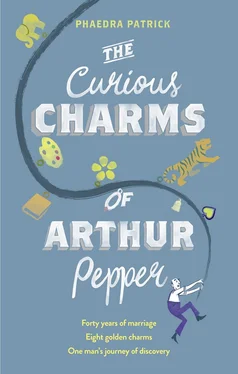He left radios on in each room so he wouldn’t have to hear his own footsteps. He survived on yoghurts and cans of soup, which he didn’t bother to heat. A spoon and a can opener were all he needed. He found himself small jobs to do: tightening the bolts on the bed to stop it squeaking, scratching out the blackened grout around the bath.
Miriam kept a fern on the windowsill in the kitchen. It was a moth-eaten thing with drooping feathery leaves. He despised it at first, resenting how such a pathetic thing could live when his wife had died. It had sat on the floor by the back door waiting for bin day. But, out of guilt, he relented and set it back in its place. He named it Frederica and began to water and talk to it. And slowly she perked up. She no longer drooped. Her leaves grew greener. It felt good to nurture something. He found it easier to chat to the plant than to people. It was good for him to keep busy. It meant he didn’t have time to be sad.
Well, that’s what he told himself, anyway. But then he’d be going about his daily tasks, kind of doing okay, holding it together. Then he’d spy the green pot pourri fabric leaf hanging in the hallway or Miriam’s mud-encrusted walking shoes in the pantry, or the lavender Crabtree & Evelyn hand cream on the shelf in the bathroom—and it would feel like a landslide. Such small meaningless items now tore at his heart.
He would sit on the bottom step of the stairs and hold his head in his hands. Rocking backward and forward, squeezing his eyes shut, he told himself that he was bound to feel like this. His grief was still raw. It would pass. She was in a better place. She wouldn’t want him to be like this. Blah blah. All the usual mumbo-jumbo from Bernadette’s leaflets. And it did pass. But it never vanished completely. He carried his loss around with him like a bowling ball in the pit of his stomach.
At these times he imagined his own father, stern, strong: ‘Bloody ‘ell. Pull yerself together, lad. Crying’s for sissies,’ and he would lift his chin and try to be brave.
Perhaps he should be getting over it by now.
His recollections of those dark early days were foggy. What he did recall was like seeing it on a black-and-white TV set with a crackly picture. He saw himself shuffling around the house.
If he was honest, then Bernadette had been a great help.
She had turned up on his doorstep like an unwelcome genie and insisted that he bathed while she cooked lunch. Arthur hadn’t wanted to eat. Food held no taste or pleasure for him.
‘Your body is like a steam train that needs coal,’ Bernadette said as he protested against the pies, soups and stews she carried over his threshold, heated and then placed in front of him. ‘How are you going to carry on your journey without fuel?’
Arthur wasn’t planning any journey. He didn’t want to leave the house. The only trip he made was upstairs to use the bathroom or go to bed. He had no desire to do anything more than that. For a quiet life he ate her food, blocked out her chatter, read her leaflets. He really would prefer to be left alone.
But she persisted. Sometimes he answered the door to her, other times he wriggled down in the bed and pulled the blankets over his head or thrust himself into National Trust statue mode. But she never gave up on him.
Later that morning, as if she knew he was thinking of her, Bernadette rang his doorbell. Arthur stood in the dining room, still for a few moments, wondering whether to go to the door. The air smelled of bacon and eggs and fresh toast as the other residents of Bank Avenue enjoyed their breakfasts. The doorbell rang again.
‘Her husband Carl died recently,’ Miriam had told him, a few years ago, as she spied Bernadette on a stall at a local church fete, selling butterfly buns and chocolate cake. ‘I think that bereaved people act in one of two ways. There are those who cling with their fingertips to the past, and those who brush their hands together and get on with their lives. That lady with the red hair is the latter. She keeps herself busy.’
‘Do you know her?’
‘She works at LadyBLovely, the boutique in the village. I bought a navy dress from there. It has tiny pearl buttons. She told me that, in her husband’s memory, she was going to help others through her baking. She said that if people are tired, lonely, heartbroken, or have simply run out of steam, then they need food. I think it’s very courageous of her to make it her mission to help others.’
From then on Arthur noticed Bernadette more—at the local school summer fair, in the post office, in her dressing gown tending roses in her garden. They said hello to each other and not much else. Sometimes he saw Bernadette and Miriam chatting on the street corner. They would laugh and talk about the weather and how strawberries were sweet this year. Bernadette’s voice was so loud that he could hear the conversation from inside the house.
Bernadette had attended Miriam’s funeral. He had a hazy memory of her appearing beside him and patting his arm. ‘If you ever need anything, just ask,’ she said and Arthur wondered what he might possibly ever ask her for. Then she had started to turn up announced on his doorstep.
At first he felt irritated by her presence, then he began to worry that she had set her sights on him, perhaps as a potential second husband. He wasn’t looking for anything like that. He never could do after Miriam. But in all the months she had been knocking on his door, Bernadette hadn’t ever given him cause to think her attention was anything more than platonic. She had a full roster of widows and widowers to call upon.
‘Mince and onion pie,’ she greeted him as he opened up. ‘Freshly made.’ She let herself into the hallway, pie-first. There, she ran her finger along the shelf over the radiator and nodded with satisfaction that it was dust free. She sniffed the air. ‘It’s a bit musty in here. Do you have air freshener?’
Arthur marvelled at how impolite she could be without realising and dutifully fetched one. A few seconds later and the cloying smell of Mountain Lavender filled the air.
She bustled into the kitchen and put the pie down on the worktop. ‘This is a mighty fine kitchen,’ she said.
‘I know.’
‘The cooker is wondrous.’
‘I know.’
Bernadette was the polar opposite to Miriam. His wife had sparrow bones. Bernadette was fleshy, cushioned. Her hair was dyed post-box red and she wore diamanté studs on the tips of her nails. One of her front teeth was stained yellow. Her voice was big, cutting through the quiet of his home like a machete. He jangled the bracelet nervously in his pocket. Since speaking to Mr Mehra last night, he had kept it with him. He had studied each charm in turn several times.
India. It was so far away. It must have been such an adventure for Miriam. Why had she not wanted him to know? Surely Mr Mehra’s story wasn’t enough for her to keep it secret.
‘Are you okay, Arthur? You’re in a dream world.’ Bernadette’s words broke his thoughts.
‘Me? Yes, of course.’
‘I called yesterday morning but you weren’t in. Did you go to Men in Caves ?’
Men in Caves was a community group for single men. Arthur had been twice to find a group of men with gloomy expressions handling chunks of wood and tools. The man who ran it, Bobby, was shaped like a skittle with a tiny head and large body. ‘Men need caves,’ he trilled. ‘They need somewhere to retreat to and be at one with themselves.’
Arthur’s neighbour with the dreadlocks had been there. Terry. He was busy filing a piece of wood. ‘I like your car,’ Arthur said to be polite.
‘It’s actually a tortoise.’
‘Oh.’
‘I saw one last week when I was mowing my lawn.’
Читать дальше












